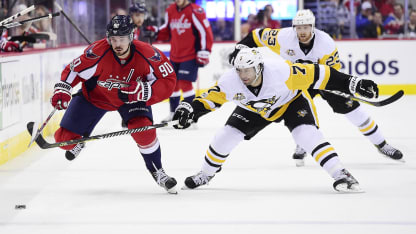Missing Kris Letang: The Penguins were able to get by defensively without Letang in the first round with Fleury covering up for many of their mistakes. They were outshot in four of the five games and gave up an average of 38.8 shots per game against the Blue Jackets after giving up 28 per game in the playoffs last season, when Letang led Pittsburgh with an average of 28:52 of ice time per game. The Penguins trying to fill in for Letang by committee with the ice time spread fairly evenly among Justin Schultz (21:16 per game), Olli Maatta (20:57), Trevor Daley (20:22), Ian Cole (19:56), Ron Hainsey (19:44) and Brian Dumoulin (19:44).
Depth charges:Ovechkin's seven points (two goals, five assists) were more than Crosby (two assists) and Evgeni Malkin (one goal, one assist) had combined in last season's series, but the Penguins prevailed because of their depth. Pittsburgh's third line of Carl Hagelin (three goals, four assists), Nick Bonino (two goals, three assists) and Phil Kessel (two goals, four assists) had 18 points. Although Hagelin remains out because of a lower-body injury, the Penguins have gotten contributions from others, such as Jake Guentzel (five goals, one assist) and Bryan Rust (four goals). The Capitals had 11 forwards score at least 12 goals in the regular season, but they were top-heavy again against the Maple Leafs, other than a surprising three goals from Tom Wilson.
Man up: The Penguins and Capitals were tied for third in the League on the power play during the regular season (23.1 percent), and each has been even better on the man-advantage in the playoffs. The Penguins went 5-for-15 (33.3 percent) and the Capitals went 5-for-17 (29.4 percent) in the first round. Kessel (two goals, two assists) and Malkin (four assists) each had four power-play points for the Penguins, and T.J. Oshie (one goal, two assists) and Kevin Shattenkirk (three assists) each had three to lead the Capitals.

